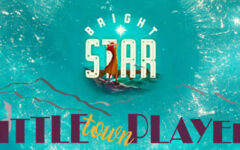 From October 1, 2010 through to the end of September 2011, we will, each day, celebrate the life of Bill Monroe by sharing information about him and those people who are associated with his life and music career. This information will include births and deaths; recording sessions; single, LP and CD release dates; and other interesting tidbits. Richard F. Thompson is responsible for the research and compilation of this information. We invite readers to share any tidbits, photos or memories you would like us to include.
From October 1, 2010 through to the end of September 2011, we will, each day, celebrate the life of Bill Monroe by sharing information about him and those people who are associated with his life and music career. This information will include births and deaths; recording sessions; single, LP and CD release dates; and other interesting tidbits. Richard F. Thompson is responsible for the research and compilation of this information. We invite readers to share any tidbits, photos or memories you would like us to include.
In the absence of any event on this date, Mike Compton, a master of the bluegrass mandolin and a protégé of Bill Monroe’s shares his thoughts about his favorite Bill Monroe number and other aspects of his relationship with the father of bluegrass music.
“My favorite Monroe melody is not a song but an instrumental. I like Tanyards the best. It is part of a slice of Monroe’s career (late 1970s-1980s) when it seems like he was exhausting ideas in the key of A. I asked Bill on several occasions what Tanyards was about and he gave me a different answer each time, two of which were that it was about a place where they tanned hides and that it was about a small community that he knew someplace. I have wondered if any of his answers were actually what the tune was about. What I see in the tune is a dark beauty, a path that is predominantly troubling and complicated. At one point in the third quarter, a light appears abruptly, a way out only to jerk him back again at the end. It is a vicious circle.
There are a number of tunes from this time that follow the A modal sound, but to me this one is one of his best and most complex. I can feel the ‘story’ in it, I see pictures in my head when I hear it. To me, that is the mark of a good melody.
I did not get to know Monroe personally until the last dozen or so years of his life, though I did make an effort much earlier. And then, I did not really stay in close contact until the last five or six. He would not acknowledge my efforts to play his music early on, so I closed off and did not make another effort at contact for over 10 more years. My loss. My usefulness to him was more or less to carry him to town on occasion, plow the garden and listen to him reminisce, kick black walnuts around the yard, or have him keep me company while I shoveled my pickup truck full of horse manure from his barn to put on my garden. Or, just sit and talk about whatever came to mind. They were everyday events, common things that anyone could engage in, ordinary conversations about ordinary things.
There is a story I have told on a number of occasions that relates to Bill’s capacity for holding a grudge over an abnormally long period of time. I witnessed a woman about Bill’s age come up and make her presence known to him at a festival in the southern states, in Georgia I believe. She walked up and put her arm around his waist and said playfully, ‘Hello Bill, do you remember me?’ Monroe glared at her and without hardly missing a beat replied, ‘Yea, I remember you. I used to think you were the prettiest thing there was. Back when we was goin’ to school, you all made fun of my eyes and I’d run way ahead of you on the way home and hide in the bushes so I could watch you walk by. You wouldn’t have nothin’ to do with me then, and I ain’t gonna have nothin’ to do with you now!’
The woman looked stunned. Seems like Bill took her arm from around his waist and told her to just, ‘Go on.’ It was an awkward moment for all of us within earshot. I remember, upon thinking of the scene later, being amazed at how long he must have carried that anger.
On a lighter note… One night late I found myself sitting at the kitchen table as Bill came in late from the Opry. I had been contemplating asking him a question I had been wanting to ask him for a long time, and it looked like now I would have my chance to talk to him with no one else around. Upon entering the room, he asked me in an aggressive voice, ‘What are you doin’ here?’ I replied that I was waiting for him. He left the room and shuffled around his bedroom for a while, hung up his overcoat and hat and came back to the kitchen table in a few minutes. We made small talk there in the lamplight for a little while.
All the time, in the back of my mind, I was pondering how to ask him my question. The question I had would be difficult to ask tactfully because it involved Bill’s death and the future of bluegrass without him. Once we came to a place where neither one of us was saying anything, I gathered up my courage and figured it was now or never. Bill sat across the table looking off into space and lightly drumming his fingertips on the table.
Here goes… ‘Bill, what would you tell someone that was wanting to play your music from here on out about how to keep it going and play it in the way you’d like it to be played, say, if you could live forever?’ Awkward…but at least I didn’t say anything about death.
Bill continued drumming his fingers on the table and looking off. After what seemed like an eternity, he said something along the lines of, ‘You’d have to get in there and really work hard and study it hard and really listen to it and get you some folks to help you, like a fiddle man and a banjo man and a guitar man and a bass man, and get in there with you and really work at it together and listen to it and let it tell you where you should really go, and like that, you know.’
I sat there with the proverbial ‘Lassie look’ waiting for the next lines that never came, the secrets to Monroe style bluegrass mandolin that he had never told. They never came. What did come was more finger-drumming and a barely perceptible smile from one side of his mouth. I didn’t know whether to feel privileged or pissed.
So much for my big chance to have the secrets of the bluegrass universe divulged in private. I knew that Bill had a strange way of speaking the truth and I wondered what worth there was in what he had just said, if there was any, or had it just been nonsensical words to avoid a poorly-worded question that related to the dream of a young man who didn’t really know what he wanted to ask.
It took a while, but it dawned on me eventually that he had indeed spoken the truth…work at it (like he did; lesson number one), listen to it, let the music tell me what to do and get like-minded people to play it with me. That was what carrying the music forward, the torch if you will, was all about. All the information I really needed was there before me, but I didn’t see it because I was looking for words that I could label as profound. I wasn’t seeing the forest for the trees.”







